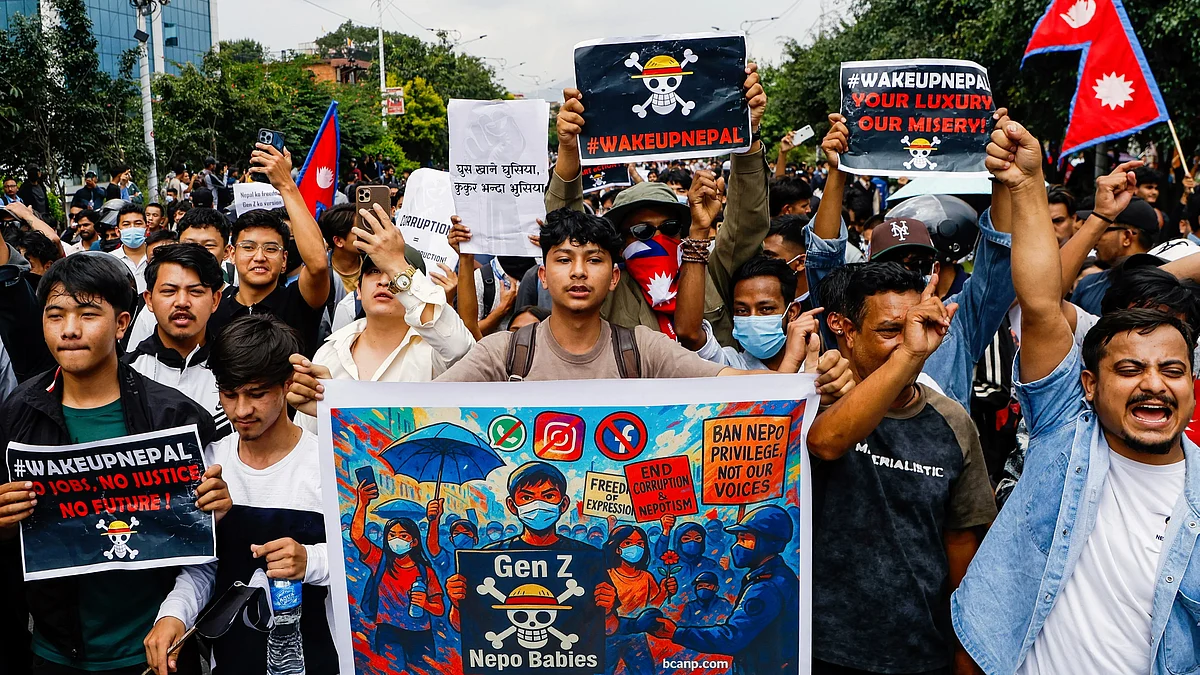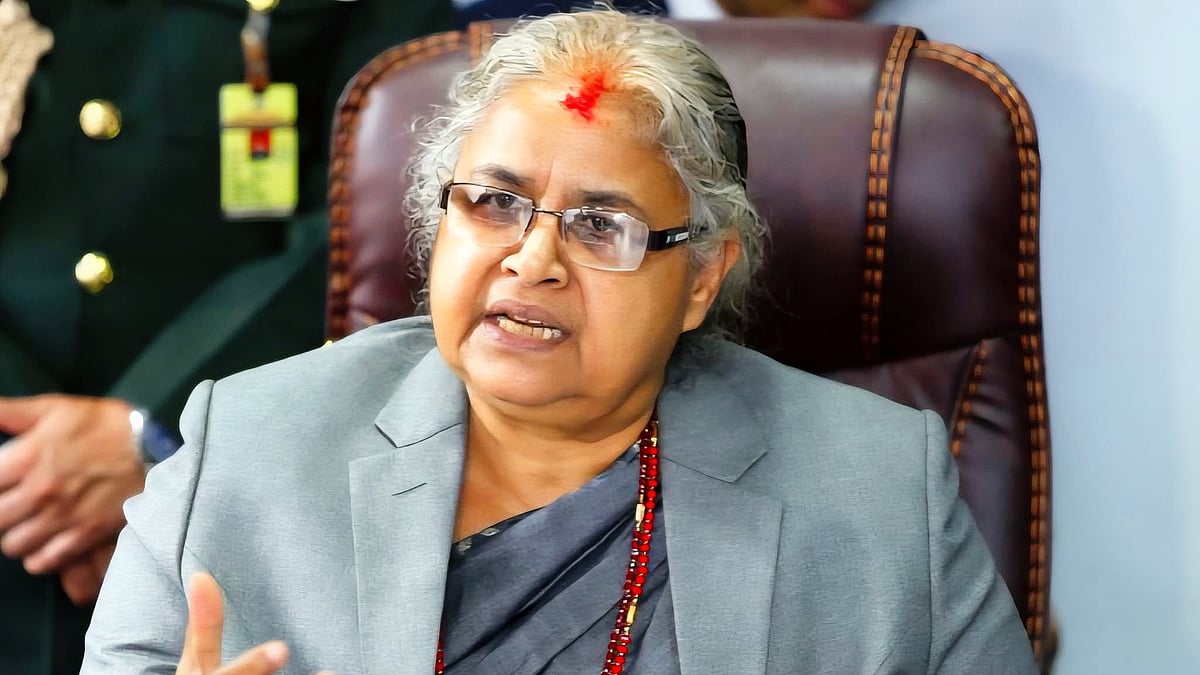Nepal upheaval: Why India cannot afford to be a bystander
Nepal’s democratic gamble is not a spectator sport. The open border, the deep cultural linkages and the large Nepali diaspora in India make instability in Kathmandu an immediate concern for New Delhi

A fragile peace under Sushila Karki’s leadership Nepal has entered a new and fragile chapter in its tumultuous democratic journey. The appointment of Sushila Karki as interim prime minister—the country’s first woman to hold the post—marks both a symbolic milestone and a pragmatic gamble.
A former Chief Justice known for her independence and integrity, Karki now finds herself steering a wounded nation out of a storm of youth-led protests, political collapse, and simmering unrest. Her very first act in office was telling. She declared the 72 victims of the 'Gen Z revolution'—a movement of young Nepalis who rose against entrenched corruption and political paralysis—as martyrs. Families of the dead were promised one million Nepali rupees each, while injured demonstrators and police officers were offered free medical care.
In a nation scarred by distrust in the political elite, her gesture signalled empathy and legitimacy. Yet the task before her is formidable. She inherits a country whose lower house of parliament has just been dissolved, whose political class is delegitimised and whose restless youth are unwilling to accept a return to business as usual.
The Gen Z uprising and the crisis of legitimacy
At the heart of Nepal’s upheaval lies the frustration of its younger citizens. In recent weeks, the streets of Kathmandu and provincial towns have been filled with demonstrators demanding change. Their grievances were clear: politicians had become synonymous with corruption, cronyism, and inertia. For them, the promise of a federal republican constitution has given way to a stagnant parliament incapable of delivering reforms.
The protests turned violent, with government buildings set ablaze and security forces responding with lethal force. Among the dead were 59 demonstrators, 10 inmates, and three police officers.
By the time calm returned, Nepal had entered a historic turning point. Acting on Karki’s advice, President Ramchandra Paudel dissolved the House of Representatives and announced fresh elections for March 2026. He called it a “difficult but necessary step” to safeguard democracy. But opposition parties labelled it unconstitutional, warning of a dangerous precedent.
The battle lines have thus shifted: between those who see dissolution as a reset and those who view it as democratic sabotage.

Karki’s interim mandate: more than a caretaker
Sushila Karki’s tenure is transitional, but her role is far more than ceremonial. She must simultaneously restore law and order, honour the sacrifices of protesters, oversee the electoral process, and ensure that Nepal does not relapse into authoritarian temptations. Her judicial background may help.
As Nepal’s first female Chief Justice in 2016–17, Karki gained respect for her refusal to bend before political interference. That reputation now gives her a rare moral authority. But as head of government, she faces a more perilous reality: competing factions, sceptical youth, and external powers eager to shape Nepal’s trajectory.
India’s moment of reckoning
For India, Nepal’s democratic gamble is not a spectator sport. The open border, the deep cultural linkages, and the large Nepali diaspora in India make instability in Kathmandu an immediate concern for New Delhi. Yet in recent years, India’s approach to Nepal has oscillated between indifference and interference, creating space for Beijing to expand its influence.
The 2015 “unofficial blockade”, coinciding with the promulgation of Nepal’s constitution, left lasting bitterness among Nepalis who saw India as heavy-handed. Since then, China has steadily deepened its footprint, investing in infrastructure and cultivating political ties.
For many young Nepalis, Beijing appears a more reliable partner than an India preoccupied with its own domestic politics and global image-building.
Sushila Karki’s rise and the Gen Z protests, however, present India with a rare opportunity to reset. By aligning itself with Nepal’s democratic aspirations, India can reclaim its role as a responsible neighbour rather than a domineering one.
Lessons from Sri Lanka and Bangladesh
The crisis in Nepal cannot be seen in isolation. Across South Asia, a pattern is unfolding: entrenched elites face uprisings from frustrated citizens, often led by young people who see democracy as hollowed out. Sri Lanka’s 2022 meltdown forced the Rajapaksa dynasty to retreat.
Bangladesh has been convulsed by violent power struggles, its democracy reduced to a shadow. Nepal now represents the third front in this regional story. India’s responses have been uneven. It played a crucial role in stabilising Sri Lanka, extending lifelines of fuel and food when Colombo ran dry. But in Bangladesh, its silence during political crackdowns damaged its credibility.
In Nepal, New Delhi must find the balance—supporting stability without sacrificing principle. What is at stake is not only Nepal’s future but India’s standing as the region’s democratic anchor. If New Delhi turns away, it risks watching another neighbour slide deeper into Beijing’s orbit.
From 'onlooker' to regional partner
Critics argue that India’s foreign policy in the current era has too often prioritised global posturing over regional stewardship. While leaders travel widely projecting India as a “Vishwaguru”, crises in the immediate neighbourhood—from Sri Lanka to Myanmar to Nepal—have been met with hesitation. The image of a “Pradhan Mookdarshak” (prime onlooker) has taken root. Yet, history offers a different template.
Atal Bihari Vajpayee’s “neighbourhood first” diplomacy, and Manmohan Singh’s quiet but steady engagement, recognised that South Asia’s stability is India’s first line of security. Their instinct was to nurture trust, not to exploit fragility.
In Nepal, India now faces a choice. It can double down on passivity, watching as events unfold and external actors exploit the vacuum. Or it can extend support—humanitarian, economic, and moral—to ensure Nepal’s transition is peaceful and democratic.
What India must do
A constructive Indian role would require a delicate mix of restraint and engagement.
Humanitarian aid without strings. Immediate assistance to the families of victims and to hospitals treating the injured would demonstrate goodwill.
Support for free elections. Backing the Election Commission and offering technical expertise can strengthen democratic credibility.
Quiet diplomacy. Encourage dialogue among Nepal’s factions while resisting the temptation to micromanage outcomes.
Regional coordination. Work with like-minded democracies, from Sri Lanka to Bhutan, to resist authoritarian drift in the neighbourhood.
Rebuilding trust. Publicly acknowledge past mistakes, particularly the memory of the blockade, and affirm respect for Nepal’s sovereignty.
A woman at the helm: symbolism and substance
Beyond geopolitics, Karki’s ascent is a milestone for gender equality in South Asia. Though the region has seen women leaders before — from Indira Gandhi and Benazir Bhutto to Sheikh Hasina and Sirimavo Bandaranaike — Nepal had until now lagged behind.
Karki’s leadership is doubly significant because it arises not from dynastic privilege but from professional merit. Her judicial career was defined by independence and principle. If she succeeds in guiding Nepal through this crisis, she may redefine what women’s leadership can mean in a region where it has too often been associated with political inheritance.
Between hope and relapse
Nepal stands at a crossroads. The dissolution of parliament has opened space for renewal but also risks deepening division. The Gen Z protesters who filled Kathmandu’s streets embody a yearning for accountable governance, but without institutional reforms, their energy could dissipate or be co-opted.
Sushila Karki’s premiership offers a chance for a reset — a pause before elections that could restore legitimacy. But if her government falters or is undermined by entrenched elites, Nepal may find itself lurching back into crisis.
(Hasnain Naqvi is a former member of the history faculty at St. Xavier’s College, Mumbai)
Follow us on: Facebook, Twitter, Google News, Instagram
Join our official telegram channel (@nationalherald) and stay updated with the latest headlines
